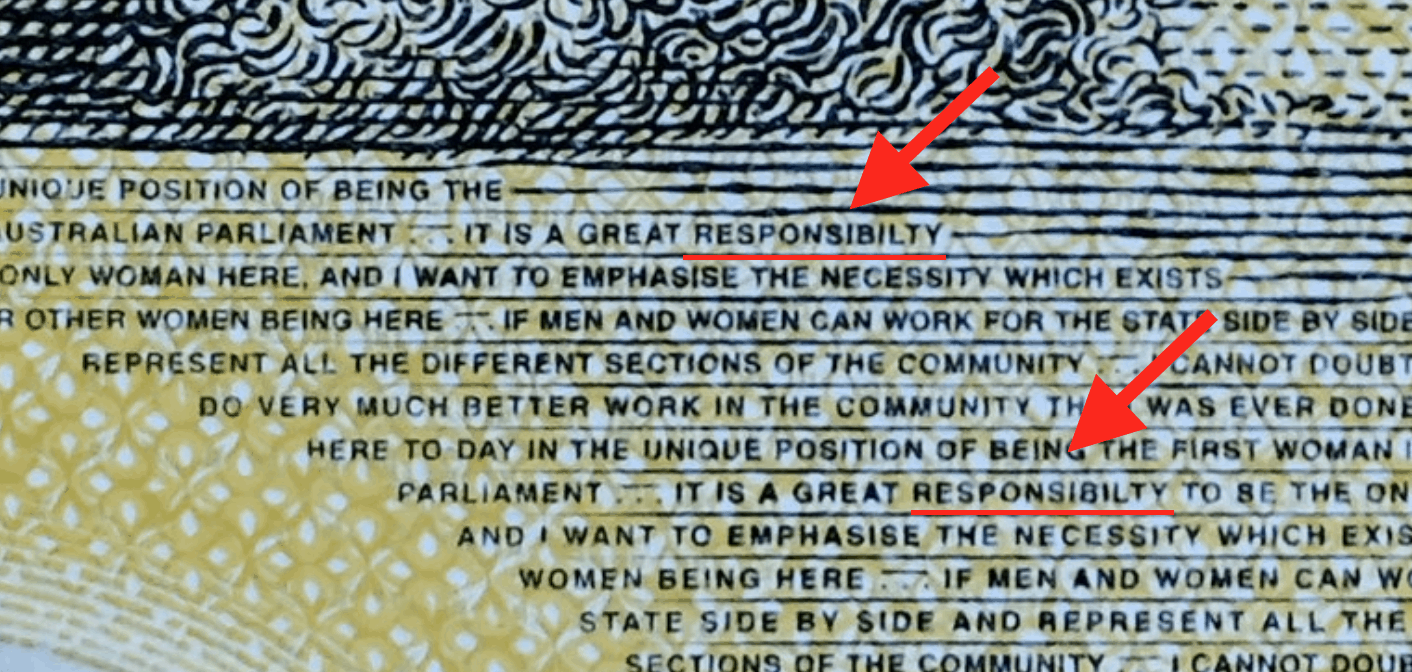Be honest, would you have seen the intentional typo in the post title if I hadn't put it on quotation marks? It's still not easy to see, is it?
Proofreading is difficult and it's impossible for even the skilled, dedicated proofreading professional to find every single small problem (see posts about errors in the initial printings of Lean Hospitals, The Toyota Way, and Measures of Success).
This story caught my eye the other day (well actually, my ear, since I heard about it first on NPR… everyone makes mistakes, indeed).
The headline:
“Australia Prints 46 Million Banknotes With a Typo“
It's in very small print:
The mistake:
“The A$50 bill, which according to Reuters is the most widely distributed bill in Australia, displays the word “responsibilty” on about 50 million notes printed in October 2018.”
Even my WordPress browser and Grammar.ly plugin find that defect (see below and the red line), but I've been told book publishing software doesn't have spell check. I'm guessing the same is true with the currency-creation software.

A better look — and I haven't marked all of the “responsibility” occurrences.

As I read about this problem, I wondered, “Who will take responsibility for this error?” And I don't mean, “Who will be blamed?”
It takes a team to create and print a bill, I'm sure. I'd guess that MANY people were in a position to catch this… but they didn't. Could we call this a systemic error?
I'd be concerned that some governmental leader would say something like, “We'll hold the responsible person accountable,” which too often means “blaming and shaming,” unfortunately. That's not really what the word “accountability” is supposed to mean.
From the article:
“The Reserve Bank of Australia (RBA) confirmed the typo and said the error would be corrected in upcoming prints runs.”
The existing bills will be left in circulation (because why not?). This isn't a matter of life and death.
As with books, the errors often don't get noticed by readers, since our brains often “correct” small errors that our eyes see.
“The error was noticed by a radio listener on Thursday, who sent a magnified photo of the RBA note. It took about six months for anyone to realize this problem.”
This article talks about the errors that are made in printing currency:
“Some are cut weirdly. Others are missing particular layers of their printing — or went through the machine twice, producing extra emphasis. Some came out as particular toner colours expired, or had their watermarks and serial-numbers printed upside down.”
I've toured the US Bureau of Engraving and Printing – Western Currency Facility in Fort Worth, Texas, and they talk about the inspections and the scrap that occur at the plant. While the currency is “work in progress,” it's just special paper and not yet legal tender.
That last article is funny in saying, at the end:
(PS: If there are any typos in this story, blame the sub-editors. Everybody else does…)
It's funny here, but blame in healthcare (and any other setting) doesn't do much to prevent future errors. If anything, blame might lead people to cover up the problem.
I wonder if anybody involved in the printing of those defective Australian bills was afraid to speak up and hoped nobody would notice, since that was better than getting in trouble??
This article says:
“The script is barely legible to the naked eye and the Reserve Bank of Australia may have got away with it, were it not for one eagle-eyed radio listener.”
Maybe it wasn't worth fixing?
This article claims the Reserve Bank of Australia already knew… after release:
“The Reserve Bank of Australia told CNN they have been aware of the issue for a few months…”
Thankfully, I read a number articles about this story, which came out last week, and I didn't see anything about blame, or did I read any politicians grandstanding and calling for anybody's head (figuratively).
We're all human…
If you found any typos in this post, blame the “sub-editor,” since I don't have one, LOL.
What do you think? Please scroll down (or click) to post a comment. Or please share the post with your thoughts on LinkedIn – and follow me or connect with me there.
Did you like this post? Make sure you don't miss a post or podcast — Subscribe to get notified about posts via email daily or weekly.
Check out my latest book, The Mistakes That Make Us: Cultivating a Culture of Learning and Innovation:










The French even misspelled the name Antoine de Saint-Exupéry on their 50 Francs banknote and corrected the mistake after 4-5 years only.
“”Certaines émissions datées 1992 et 1993 comportent une erreur typographique, le « E » comporte un accent (« Saint-Éxupéry »). Il reste en circulation jusqu’en 1997, année où l’erreur sera corrigée avec la sortie d’un nouveau billet sans l’accent (« Saint-Exupéry »).””
Thanks for sharing that, Zoe! Merci…
So… I have a red face! I fancy myself as having a keen eye for details and quality problems. Even after being goaded by your post–“find the error”–and focusing on the word “responsibility,” I still missed the error. Did I rush? Yes. Do frontline workers rush? Yes. How do we prevent rushing? This is the 6-million dollar question. :-)
Great question, Karen.
I keep coming back to the Darril Wilburn quote (former Toyota guy) about leaders being responsible for creating a system in which people can be successful.
One reason people rush is that work is poorly designed and they’re overburdened (this is quite common healthcare, right?).
Asking “why?” is of course the right train of thought, as you say.
If anyone has done the “Count the F’s” exercise, they’ll understand the inherent folly of manual inspections. OCR is a thing. Spellcheck is a thing. If our quality systems our dependent on audits and visual checks, bad things inevitably happen. Luckily this was just the fine print.